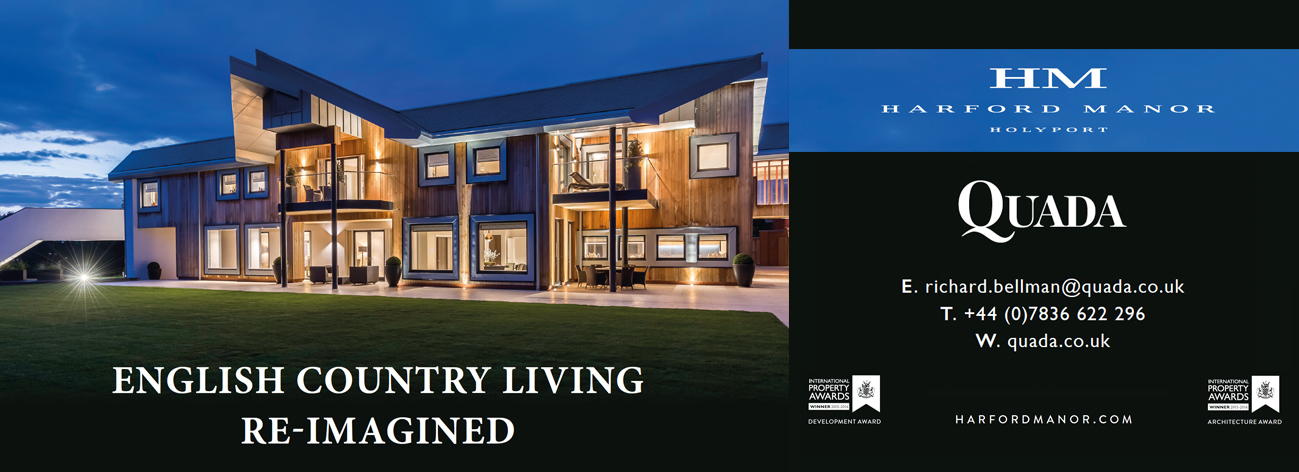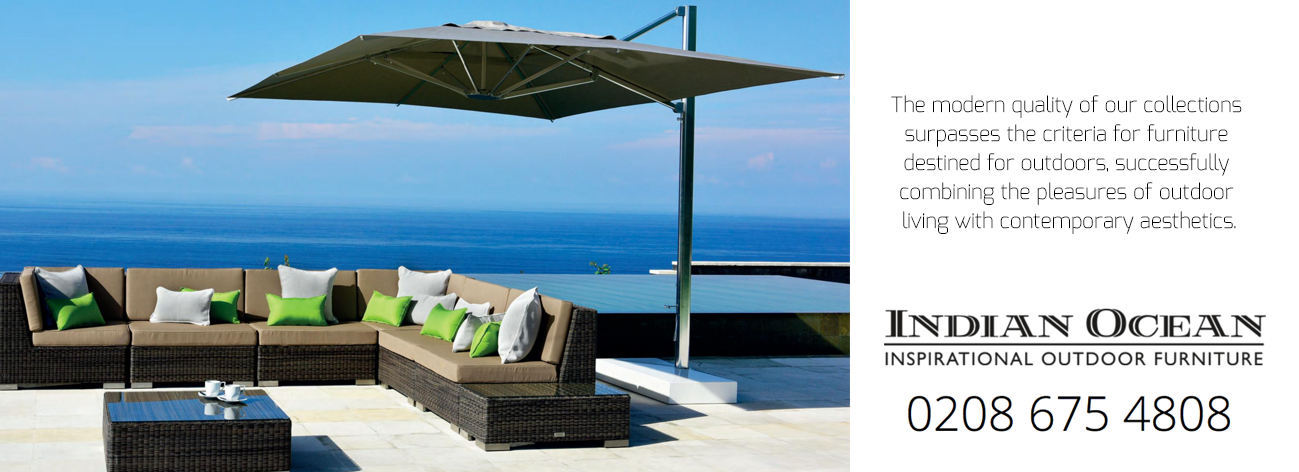INTERVIEW
Surrey’s Premier Lifestyle Magazine
Ancient order
He’s best-known for his fascinating TV insights into the ancient world, presenting landmark BBC documentaries such as Italy’s Invisible Cities, Professor Michael Scott will be bringing Ancient Invisible Cities: Cairo, Istanbul and Athens to our screens this autumn. essence talks to him about his life and interest in the ancient world.
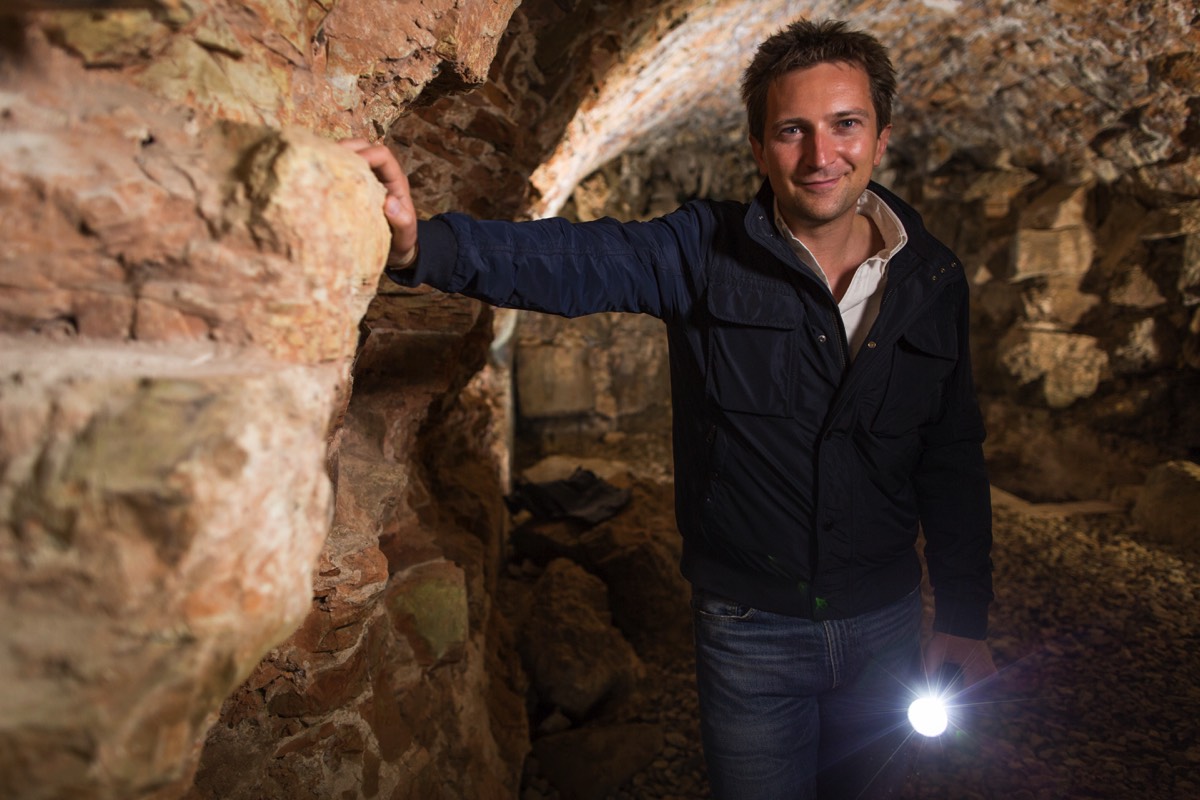
Photo copyright: Freddie Claire
Q Michael, you grew up in Wimbledon – fond memories?
A From the age of eight, yes. I attended KCS Wimbledon and loved riding my bike around Wimbledon Common, the circus coming to town each year and, of course, the extraordinary display of Wimbledon tennis fortnight. I also have hugely fond memories of a tiny old tea shop called Forget Me Not Teas. It was really old fashioned with lots of bone china and lace. My dad and I used to go on special occasions to have crumpets and tea. The tea shop is no longer there, it’s since been turned into a private house, but every time I go past I remember the smell and taste of the crumpets oozing honey and jam. My parents still live in Wimbledon, and I still have friends there, so I love going back, catching up and being in a place that has been part of my life for 30 years now.
Q What sparked your interest in Classics?
A I hated Latin at school and gave it up aged 13. But I was lucky enough to be introduced to a few letters of the ancient Greek alphabet at around the same time and something about the mystery and magic of it just clicked. I kept going with Greek, even though at the time I had no intention of becoming a Classicist. When I was 17, I went on a school trip to Greece – in fact I had my seventeenth birthday the day we visited the ancient site of Olympia. The trip did not start well – the airline lost my luggage on the way out and never found it. I spent the whole week in Greece in the same pair of jeans and a couple of t-shirts bought in a Greek supermarket. But I loved it. Being in the ancient sites – in the actual locations and places where all the things I had been learning about happened so long ago for me was inspiring and fascinating. Looking back, it was then that I caught the Classics’ bug. I came home and decided I wanted to study Classics at university.
Q What other careers did you consider?
A Up until I was 15 I wanted to become a doctor or surgeon, and I still love watching medical programmes and documentaries today. Then I thought I would become a lawyer – even after I decided I wanted to study Classics at university, long term I thought I would convert to law after my degree. Then during my undergraduate I had one summer in which I did both a law firm internship and a summer school at the British School at Rome (visiting all the major archaeological sites in Rome and the surrounding area). That made me think I wanted to do a Masters in Classics rather than go straight into law. And then during the Masters, I was based at the British School at Athens for three months. Working out on the sites across Greece, and with researchers from the 17 other foreign schools of archaeology based in Athens, along with Greek archaeologists, got me completely addicted to history and archaeology. I’ve never looked back since.
A From the age of eight, yes. I attended KCS Wimbledon and loved riding my bike around Wimbledon Common, the circus coming to town each year and, of course, the extraordinary display of Wimbledon tennis fortnight. I also have hugely fond memories of a tiny old tea shop called Forget Me Not Teas. It was really old fashioned with lots of bone china and lace. My dad and I used to go on special occasions to have crumpets and tea. The tea shop is no longer there, it’s since been turned into a private house, but every time I go past I remember the smell and taste of the crumpets oozing honey and jam. My parents still live in Wimbledon, and I still have friends there, so I love going back, catching up and being in a place that has been part of my life for 30 years now.
Q What sparked your interest in Classics?
A I hated Latin at school and gave it up aged 13. But I was lucky enough to be introduced to a few letters of the ancient Greek alphabet at around the same time and something about the mystery and magic of it just clicked. I kept going with Greek, even though at the time I had no intention of becoming a Classicist. When I was 17, I went on a school trip to Greece – in fact I had my seventeenth birthday the day we visited the ancient site of Olympia. The trip did not start well – the airline lost my luggage on the way out and never found it. I spent the whole week in Greece in the same pair of jeans and a couple of t-shirts bought in a Greek supermarket. But I loved it. Being in the ancient sites – in the actual locations and places where all the things I had been learning about happened so long ago for me was inspiring and fascinating. Looking back, it was then that I caught the Classics’ bug. I came home and decided I wanted to study Classics at university.
Q What other careers did you consider?
A Up until I was 15 I wanted to become a doctor or surgeon, and I still love watching medical programmes and documentaries today. Then I thought I would become a lawyer – even after I decided I wanted to study Classics at university, long term I thought I would convert to law after my degree. Then during my undergraduate I had one summer in which I did both a law firm internship and a summer school at the British School at Rome (visiting all the major archaeological sites in Rome and the surrounding area). That made me think I wanted to do a Masters in Classics rather than go straight into law. And then during the Masters, I was based at the British School at Athens for three months. Working out on the sites across Greece, and with researchers from the 17 other foreign schools of archaeology based in Athens, along with Greek archaeologists, got me completely addicted to history and archaeology. I’ve never looked back since.
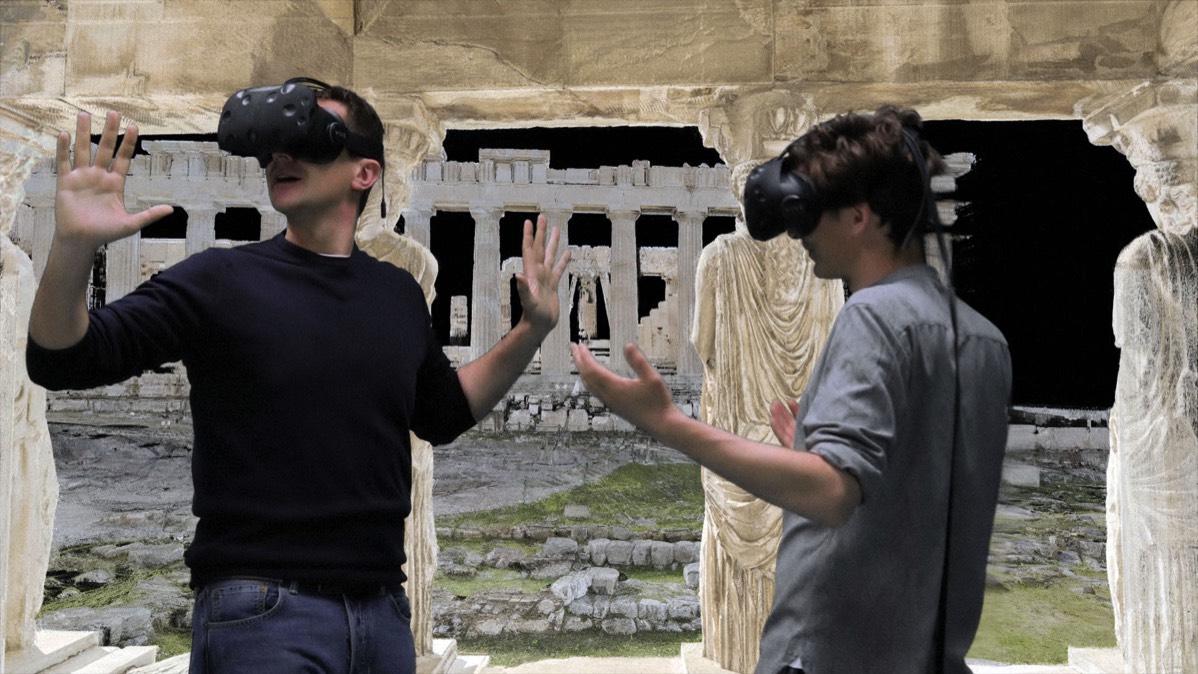
Michael Scott and contributor Matthew Shaw explore a virtual version of The Porch of the Caryatids at the Acropolis - Photo copyright: BBC
Q Was it necessary to learn Latin and Greek?
A I was the one of the first students to be admitted to Cambridge to read Classics who did not have Latin A-level. Up until that point, it had been normal for students to come with Latin and learn Greek while they were undergraduates. I was an oddity in having Greek, but no Latin. That year there were two of us: one person with no Latin or Greek, and me with little Latin. Now every university Classics’ department in the country takes students who have no previous experience of studying Latin or Greek. Not knowing the languages is no bar to studying the ancient world. In fact, at the University of Warwick where I teach as a full-time professor, we have lots of students who have never studied formerly at school the ancient world in any way before they come to us – but they have seen an exhibition, read a book or seen films that inspired them to want to learn more. And that, for me, is all that matters.
Q Both languages seem to be appearing more on school curriculums (Greek less than Latin), what do you think their value is?
A Over the last two decades, there has been a fantastic UK-wide concerted effort to support the reintroduction of the ancient languages into primary and secondary schools, alongside the teaching of Classical Civilisation and Ancient History. I have been involved with lots of these initiatives and love going into schools to see the difference these subjects can make. I have seen how learning Latin at primary school can help students, often from a wide range of international backgrounds and native languages, be more confident in their English. At Warwick, I have worked closely over the last years with schools in Coventry, like Sidney Stringer Academy, where students say that learning Latin (and some Greek) has helped them understand the world around them better and help them feel a more integrated part of it (listen to the podcast of the students talking www.youtube.com/watch?v=Ge4AItVlmK8). This year
I have launched the Warwick Classics Network, which is working with national Charity Classics for All to help support the teaching and introduction of Classical Civilisation and Ancient History in schools across Coventry and Warwickshire – where teachers tell us that students not only love the often weird and wacky world of the ancients, but find it incredibly helpful in developing their own ability to appreciate cultural difference (which in our increasingly globalised world is only going to become an even more important skill in the future).
Q You spent 10 years at Cambridge and then moved to Warwick. What was the reason for the change?
A It was just part of the way the academic career path works. I was extremely fortunate to study for my undergraduate, Masters, PhD at Cambridge and then win the Moses and Mary Finley Research Fellowship at Darwin College. That time at Darwin, from 2007–2012, was incredibly formative for me – it was during that time that I published my first books, gave my first lectures and presented my first TV documentaries (starting with Delphi: The Bellybutton of the Ancient World for BBC4 in 2010). Darwin was where I developed my idea of what kind of academic I wanted to be: not only researching and teaching, but also communicating that research, my enthusiasm for it and the importance of it, to the wider world. But research fellowships are always time limited posts, and when I came to apply for permanent lectureship positions, it was Warwick who offered me a home.
A I was the one of the first students to be admitted to Cambridge to read Classics who did not have Latin A-level. Up until that point, it had been normal for students to come with Latin and learn Greek while they were undergraduates. I was an oddity in having Greek, but no Latin. That year there were two of us: one person with no Latin or Greek, and me with little Latin. Now every university Classics’ department in the country takes students who have no previous experience of studying Latin or Greek. Not knowing the languages is no bar to studying the ancient world. In fact, at the University of Warwick where I teach as a full-time professor, we have lots of students who have never studied formerly at school the ancient world in any way before they come to us – but they have seen an exhibition, read a book or seen films that inspired them to want to learn more. And that, for me, is all that matters.
Q Both languages seem to be appearing more on school curriculums (Greek less than Latin), what do you think their value is?
A Over the last two decades, there has been a fantastic UK-wide concerted effort to support the reintroduction of the ancient languages into primary and secondary schools, alongside the teaching of Classical Civilisation and Ancient History. I have been involved with lots of these initiatives and love going into schools to see the difference these subjects can make. I have seen how learning Latin at primary school can help students, often from a wide range of international backgrounds and native languages, be more confident in their English. At Warwick, I have worked closely over the last years with schools in Coventry, like Sidney Stringer Academy, where students say that learning Latin (and some Greek) has helped them understand the world around them better and help them feel a more integrated part of it (listen to the podcast of the students talking www.youtube.com/watch?v=Ge4AItVlmK8). This year
I have launched the Warwick Classics Network, which is working with national Charity Classics for All to help support the teaching and introduction of Classical Civilisation and Ancient History in schools across Coventry and Warwickshire – where teachers tell us that students not only love the often weird and wacky world of the ancients, but find it incredibly helpful in developing their own ability to appreciate cultural difference (which in our increasingly globalised world is only going to become an even more important skill in the future).
Q You spent 10 years at Cambridge and then moved to Warwick. What was the reason for the change?
A It was just part of the way the academic career path works. I was extremely fortunate to study for my undergraduate, Masters, PhD at Cambridge and then win the Moses and Mary Finley Research Fellowship at Darwin College. That time at Darwin, from 2007–2012, was incredibly formative for me – it was during that time that I published my first books, gave my first lectures and presented my first TV documentaries (starting with Delphi: The Bellybutton of the Ancient World for BBC4 in 2010). Darwin was where I developed my idea of what kind of academic I wanted to be: not only researching and teaching, but also communicating that research, my enthusiasm for it and the importance of it, to the wider world. But research fellowships are always time limited posts, and when I came to apply for permanent lectureship positions, it was Warwick who offered me a home.
Q What do you like best about your work at Warwick?
A For me, the thing that defines Warwick is its attitude to innovation. If I say I want to try something new – whether it be in terms of my research, teaching or outreach and engagement work, the Warwick answer is almost inevitably: “Why not? Let’s try it and see!” That makes for an incredibly inspiring and invigorating atmosphere to work in – and I love it.
Q Your documentary Sicily: Wonder of the Mediterranean provided a historical perspective on the current migration crisis. Sicily has been and is currently a focal point of the refugee crisis. What lessons from history can Sicily teach us?
A I remember vividly, while filming with the head of the Italian Coast Guard, him saying that Sicilians – because of their history – have multiculturalism in their blood. Sicilians today are the result of centuries of arrivals from every point of the compass. The island’s story is one of the advantages and disadvantages of global interaction and migration. In many ways it’s no surprise that Sicily has once again been at the forefront of global migration as Europe has faced the biggest mass movement of people since the Second World War. And Sicily is keen this time for its attitude to be seen as an exemplar to the world. As the Mayor of Palermo, Leoluca Orlando, told us, Sicily is setting an example to the world that, in his words, “welcome is the best guarantee of safety.” Whether you agree with that or not (and there are plenty of people and nations who don’t), it is a powerful argument to be reckoned with.
Q Greece was the birthplace of the Olympics which I understand was a pretty harsh environment with no prizes for second place: the losers could be disowned by their families. What parallels do you think there are with today’s celebrity obsession?
A Absolutely, the ancient Olympics, I think, was a place not many of us would want to be: cramped, dusty, hot, busy, no sanitation, flies buzzing around, hundreds of sacrificed animals being roasted on giant barbecues, athletes competing to win (sometimes to the death) and where anything but first place was immaterial. That cult of competition, and victory, ran deep in the DNA of the ancient Greeks. They liked to live in a society in which they were constantly confronted and challenged as to whether they were good enough – which is why the vast majority of their statues that have survived today are of people at the peak of human physical perfection (and often, indeed, uber-perfection with bodies that are impossible to have, however much you go to the gym). So there are many parallels with our glossy magazine, airbrushed, celebrity culture. Which is why in many ways I think studying the ancient world today is so relevant and important – it gives us the tools to be able to take a step back and understand better our own world.
A For me, the thing that defines Warwick is its attitude to innovation. If I say I want to try something new – whether it be in terms of my research, teaching or outreach and engagement work, the Warwick answer is almost inevitably: “Why not? Let’s try it and see!” That makes for an incredibly inspiring and invigorating atmosphere to work in – and I love it.
Q Your documentary Sicily: Wonder of the Mediterranean provided a historical perspective on the current migration crisis. Sicily has been and is currently a focal point of the refugee crisis. What lessons from history can Sicily teach us?
A I remember vividly, while filming with the head of the Italian Coast Guard, him saying that Sicilians – because of their history – have multiculturalism in their blood. Sicilians today are the result of centuries of arrivals from every point of the compass. The island’s story is one of the advantages and disadvantages of global interaction and migration. In many ways it’s no surprise that Sicily has once again been at the forefront of global migration as Europe has faced the biggest mass movement of people since the Second World War. And Sicily is keen this time for its attitude to be seen as an exemplar to the world. As the Mayor of Palermo, Leoluca Orlando, told us, Sicily is setting an example to the world that, in his words, “welcome is the best guarantee of safety.” Whether you agree with that or not (and there are plenty of people and nations who don’t), it is a powerful argument to be reckoned with.
Q Greece was the birthplace of the Olympics which I understand was a pretty harsh environment with no prizes for second place: the losers could be disowned by their families. What parallels do you think there are with today’s celebrity obsession?
A Absolutely, the ancient Olympics, I think, was a place not many of us would want to be: cramped, dusty, hot, busy, no sanitation, flies buzzing around, hundreds of sacrificed animals being roasted on giant barbecues, athletes competing to win (sometimes to the death) and where anything but first place was immaterial. That cult of competition, and victory, ran deep in the DNA of the ancient Greeks. They liked to live in a society in which they were constantly confronted and challenged as to whether they were good enough – which is why the vast majority of their statues that have survived today are of people at the peak of human physical perfection (and often, indeed, uber-perfection with bodies that are impossible to have, however much you go to the gym). So there are many parallels with our glossy magazine, airbrushed, celebrity culture. Which is why in many ways I think studying the ancient world today is so relevant and important – it gives us the tools to be able to take a step back and understand better our own world.
Photo copyright: Freddie Claire
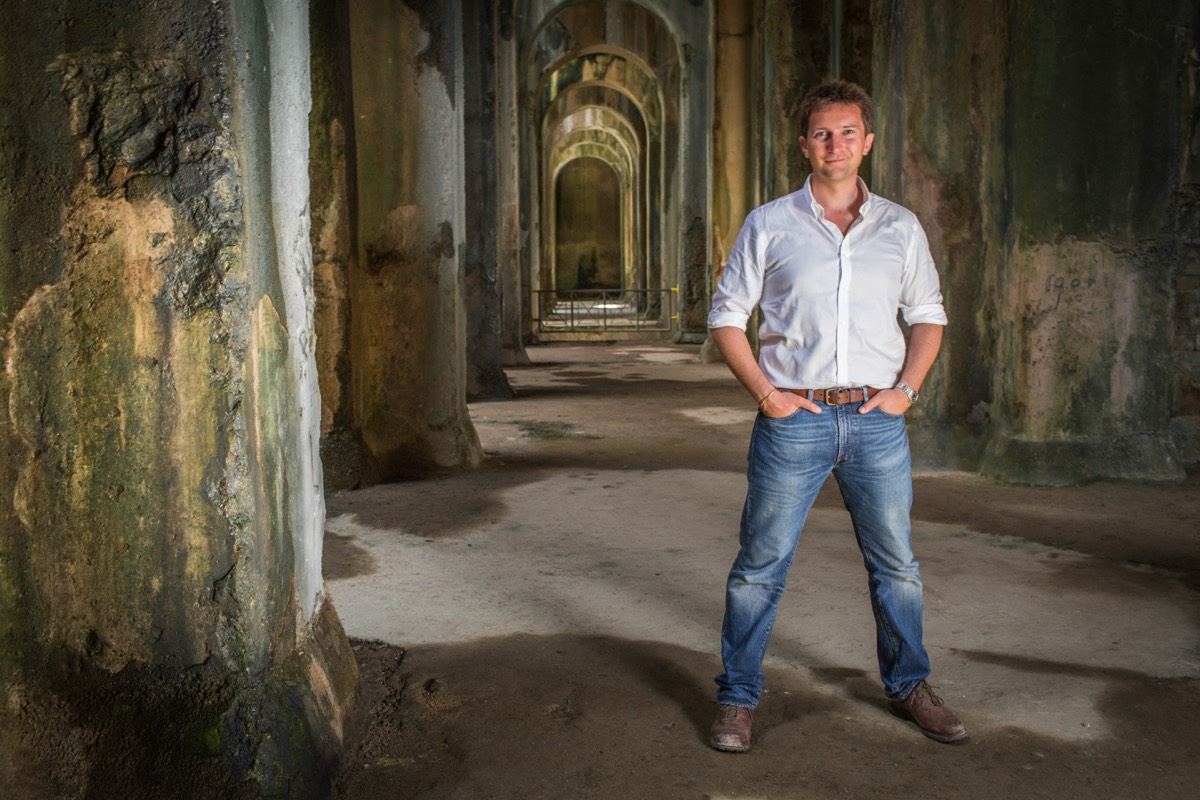
Profile: Professor Michael Scott
Michael Scott is an academic, author and broadcaster in the field of Classics and Ancient History. He wrote and presented his first BBC documentary Delphi: The Bellybutton of the Ancient World in 2010 and has since written and presented a wide range of television and radio documentary programmes for National Geographic, History Channel, BBC Radio 4 and ITV.
Michael is one of the youngest Warwick Faculty of Arts academics in recent history to be made a Professor and is an honorary citizen of Delphi, Greece in recognition of his work to bring the site to world attention.
In recent filming, Michael has found himself inside active volcanoes, scuba diving in Venetian canals, investigating underneath pyramids and abseiling into underground quarries in order to reach never before filmed locations. He will next be seen hosting the latest instalment in the Invisible Cities series entitled Ancient Invisible Cities: Cairo, Istanbul and Athens which will air in three parts on BBC2 this month. The documentary series will uncover forgotten, hard to reach and invisible aspects of these extraordinary cities and in doing so offer new perspectives on their dramatic and important histories.
Bringing the ancient world to the modern, Michael often lectures around the globe and brings his passion and knowledge to radio and television as the writer and/or presenter of various programmes.
Michael Scott is an academic, author and broadcaster in the field of Classics and Ancient History. He wrote and presented his first BBC documentary Delphi: The Bellybutton of the Ancient World in 2010 and has since written and presented a wide range of television and radio documentary programmes for National Geographic, History Channel, BBC Radio 4 and ITV.
Michael is one of the youngest Warwick Faculty of Arts academics in recent history to be made a Professor and is an honorary citizen of Delphi, Greece in recognition of his work to bring the site to world attention.
In recent filming, Michael has found himself inside active volcanoes, scuba diving in Venetian canals, investigating underneath pyramids and abseiling into underground quarries in order to reach never before filmed locations. He will next be seen hosting the latest instalment in the Invisible Cities series entitled Ancient Invisible Cities: Cairo, Istanbul and Athens which will air in three parts on BBC2 this month. The documentary series will uncover forgotten, hard to reach and invisible aspects of these extraordinary cities and in doing so offer new perspectives on their dramatic and important histories.
Bringing the ancient world to the modern, Michael often lectures around the globe and brings his passion and knowledge to radio and television as the writer and/or presenter of various programmes.
Q You use a fair amount of the latest technology in your documentaries – what does 3D scanning offer?
A We introduced 3D laser scanning into our documentaries initially because we thought it would be a great way to help people visualise locations not easily accessible to tourists, and also to visualise how sites below ground linked up with those more familiar sites above ground. But as the technology has improved over the different series, with portable backpack-mounted laser scanning, photogrammetry from helicopters and drones, as well as the ability to melt together 3D visualisations, virtual reality and real film, it has come to play an ever more important variety of roles within the programmes: providing shot angles that are impossible to achieve in real life; acting as a way of journeying from one location to another while still providing context and allowing viewers to experience for themselves the locations through VR.
Q Are there any apps you would recommend for people interested in ancient history?
A I have been developing with Warwick University a new digital platform Oiko.world, just recently launched. Oiko.world offers people the chance to engage with the interactions and connections between ancient cultures from the Mediterranean to China. You can explore through a world map, or you can bring together your own comparative timelines of what was happening where and when. So often we fall into the trap of studying just one little part of the world and forget to think about how it connected in to everything else that was going on at the same time. Oiko.world is designed to help remedy that!
Q Tell us a little about the new series of Ancient Invisible Cities, to be aired on BBC2 this autumn, and why choose Cairo, Istanbul and Athens?
A We wanted cities with long histories stretching from antiquity to the modern day, but which also had immediate recognition for viewers. I think Cairo, Athens and Istanbul all conjure up images in our minds – of ancient Egyptian pyramids in Cairo, of Greeks doing democracy in Athens and of people from east and west meeting in the great melting pot of Istanbul. We throw ourselves into the unique cultures of each of these cities and try to give people a flavour of what it’s like to visit them. And at the same time we investigate the particularly hard to reach places, like the normally closed off underground tunnels and vaults of the Great Pyramid in Cairo, or places that have never been filmed before like the 16m deep underground Hadrianic era Aqueducts of Athens. Not only do we explore them in reality and using our 3D laser scans, but we also try to understand how these spaces played a key role in helping the city to function and develop, and ask what these locations can tell us about the people who lived, worked and ruled in them. And then at the end of each programme, we revisit these cities from within a virtual reality studio, exploring them in ways not possible in the real world – walking through walls, through solid earth or flying through the sky – in order to get a sense of these cities as a whole over their long history.
Q What projects have you lined up next?
A Having been abseiling down 16m underground tunnels, diving to sites underwater, exploring under millions of tons of rock and crawling through tiny cave tunnels, I’m glad to be putting my feet up for a moment! But I’ve already got an eye out for what cities we might explore next, and I am about to head back into a full teaching year at Warwick, where I am launching a new undergraduate module which will explore ancient global history from the Mediterranean to China. It will be the first undergraduate module of its kind in any UK university – and I can’t wait to work on it with my students.
A We introduced 3D laser scanning into our documentaries initially because we thought it would be a great way to help people visualise locations not easily accessible to tourists, and also to visualise how sites below ground linked up with those more familiar sites above ground. But as the technology has improved over the different series, with portable backpack-mounted laser scanning, photogrammetry from helicopters and drones, as well as the ability to melt together 3D visualisations, virtual reality and real film, it has come to play an ever more important variety of roles within the programmes: providing shot angles that are impossible to achieve in real life; acting as a way of journeying from one location to another while still providing context and allowing viewers to experience for themselves the locations through VR.
Q Are there any apps you would recommend for people interested in ancient history?
A I have been developing with Warwick University a new digital platform Oiko.world, just recently launched. Oiko.world offers people the chance to engage with the interactions and connections between ancient cultures from the Mediterranean to China. You can explore through a world map, or you can bring together your own comparative timelines of what was happening where and when. So often we fall into the trap of studying just one little part of the world and forget to think about how it connected in to everything else that was going on at the same time. Oiko.world is designed to help remedy that!
Q Tell us a little about the new series of Ancient Invisible Cities, to be aired on BBC2 this autumn, and why choose Cairo, Istanbul and Athens?
A We wanted cities with long histories stretching from antiquity to the modern day, but which also had immediate recognition for viewers. I think Cairo, Athens and Istanbul all conjure up images in our minds – of ancient Egyptian pyramids in Cairo, of Greeks doing democracy in Athens and of people from east and west meeting in the great melting pot of Istanbul. We throw ourselves into the unique cultures of each of these cities and try to give people a flavour of what it’s like to visit them. And at the same time we investigate the particularly hard to reach places, like the normally closed off underground tunnels and vaults of the Great Pyramid in Cairo, or places that have never been filmed before like the 16m deep underground Hadrianic era Aqueducts of Athens. Not only do we explore them in reality and using our 3D laser scans, but we also try to understand how these spaces played a key role in helping the city to function and develop, and ask what these locations can tell us about the people who lived, worked and ruled in them. And then at the end of each programme, we revisit these cities from within a virtual reality studio, exploring them in ways not possible in the real world – walking through walls, through solid earth or flying through the sky – in order to get a sense of these cities as a whole over their long history.
Q What projects have you lined up next?
A Having been abseiling down 16m underground tunnels, diving to sites underwater, exploring under millions of tons of rock and crawling through tiny cave tunnels, I’m glad to be putting my feet up for a moment! But I’ve already got an eye out for what cities we might explore next, and I am about to head back into a full teaching year at Warwick, where I am launching a new undergraduate module which will explore ancient global history from the Mediterranean to China. It will be the first undergraduate module of its kind in any UK university – and I can’t wait to work on it with my students.
essence info
Ancient Invisible Cities: Cairo, Istanbul and Athens will begin airing on Friday 7 September at 9pm on BBC2 and will be available to view on BBC iPlayer.You can follow Professor Michael Scott using the links below.
@profmcsco.
Twitter: @profmcscott
Instagram: @profmcscott
Website: www.michaelcscott.com
“Scott is a lucid teacher who brings the past to life with his effortlessly engaging style.”
The Mail on Sunday
